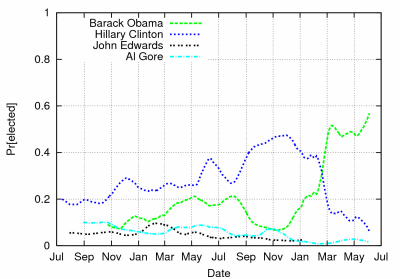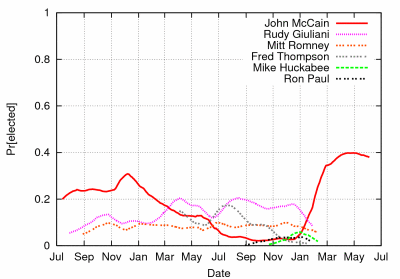Recent electability
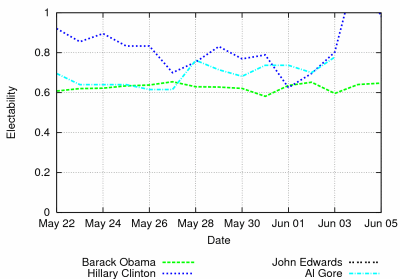
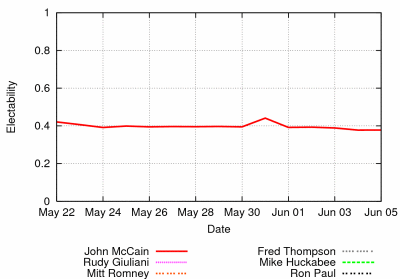
Lifetime electability (30-day moving average)
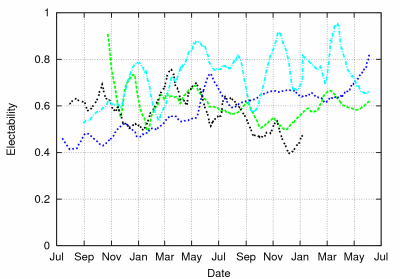
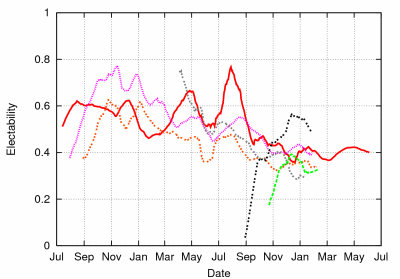
How electable are the candidates for our next president? That is, if they were nominated, what chance would they have of being elected?
Prediction markets give us a way to estimate the probability of certain events. For example, the Iowa Electronic Markets offer a contract which will pay out at $1 if the Republican nominee receives more popular votes than the Democrat, and $0 otherwise. The market price of this contract can be seen as an estimate of the probability that the Republican nominee wins more of the popular vote. Intrade has similar contracts for each individual candidate. Historically, these markets have been more accurate predictors than polls. However, to the best of my knowledge, none of the markets measure electability as such.
But we can infer electability fairly easily. Using conditional probabilities,
Pr[elected] = Pr[elected | nominated] · Pr[nominated] + Pr[elected | not nominated] · Pr[not nominated].
We can fairly safely assume that Pr[elected | not nominated] = 0 (which did not hold for Joe Lieberman, but that wasn't a presidential election). Thus, we are left with
Pr[elected] = Pr[elected | nominated] · Pr[nominated],
so electability can be estimated as Pr[elected] / Pr[nominated]. Intrade has contracts which can be used to estimate those two probabilities for the major candidates, and makes historical daily closing prices conveniently available.
The plots above show estimated electability as a function of time, updated daily. Interestingly, [as of February 2007] neither party's frontrunner is the most electable candidate for their party. Among the Republicans, McCain and Romney are fairly consistently bested by Giuliani. Among the Democrats, Hillary Clinton is historically the least electable.
What can we make of Obama's stellar 90% electability or Giuliani's 85% in October 2006? Well, in short, if you think that was a poor prediction, then you missed an opportunity to earn some money by purchasing the appropriate contracts at Intrade---either betting that their nomination was more likely, or that their chance of winning the election was less likely.
--Brighten Godfrey - 2007.02.11
Update 2007.02.15: Looks like I'm not the first to have this idea. Also, in a comment in a later article on that blog, Paul makes a point that is worth noting about the definition of electability we're using here. The point can be succinctly paraphrased as follows: in scenarios that lead to Giuliani's nomination, he has currently about a 56% chance of winning; and in scenarios that lead to McCain's nomination, he has a 49% chance of winning. But those are different scenarios. So we cannot conclude that in scenarios that lead to McCain's nomination, Giuliani would have had a better chance of winning if only the Republican Party had nominated him instead of McCain. More discussion here.
Pr[nominated] (30-day moving average)
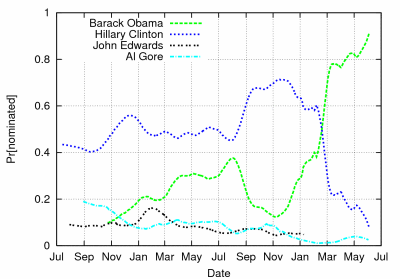
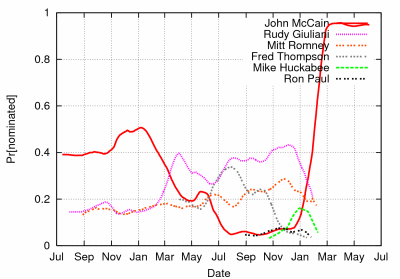
Pr[elected] (30-day moving average)
